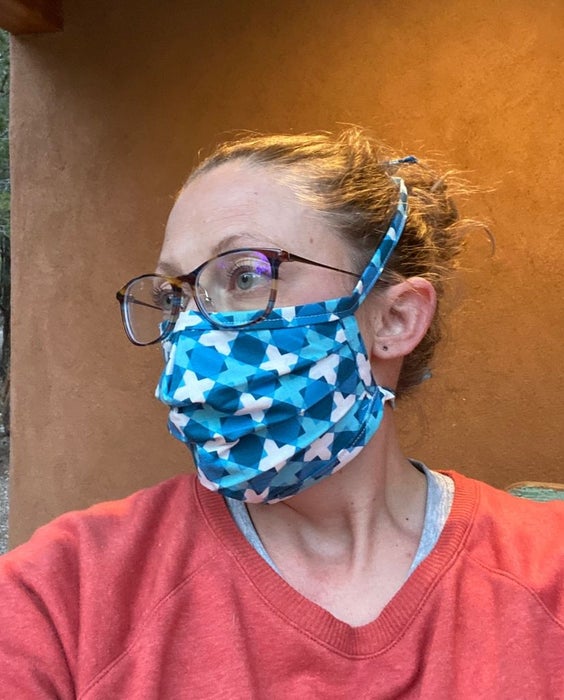DIY personal protective equipment, Part 1
 Processing Request
Processing Request
By Crystal Valentine
4/6/2020 update:
- Joann Fabrics in FDL has closed temporarily, so it is no longer possible to pick up mask kits at the store. Their website https://www.joann.com/make-to-
give-response/ continues to be a useful source of patterns for mask-making. - The Facebook group https://www.facebook.com/
groups/ is the best way to stay current on locations requesting donations and the currently accepted sewing patterns for those locations. Masks for health-care workers have specific requirements, so please use this site to make sure your donations meet the location’s needs. For those with interests in the Milwaukee area, the Facebook group https://www.facebook.com/WisconsinFaceMaskWarriors/ groups/ covers Milwaukee and surrounding counties.MaskedSewistsSEWisconsin/ - Watch for an updated blog post soon on making masks for personal use rather than for donation to health-care workers.
Many people have access to a sewing machine and cotton fabric, so what about sewing face masks for health-care workers?
While homemade masks are not as effective as proper surgical masks, they are better than nothing. A study of the filtration properties of sewn masks showed that they had about 50-60 percent effectiveness at capturing particles the size of a coronavirus. Another study, this one comparing hospitals that used cloth masks vs. disposable surgical masks, showed a much higher infection rate among workers who used the cloth masks. But, so far, there’s not been a study comparing cloth masks to no masks at all. The CDC reaches the following conclusion: “In settings where face masks are not available, health-care professionals might use homemade masks (e.g., bandana, scarf) for care of patients with COVID-19 as a last resort. However, homemade masks are not considered personal protective equipment, since their capability to protect health-care professionals is unknown. Caution should be exercised when considering this option. Homemade masks should ideally be used in combination with a face shield that covers the entire front (that extends to the chin or below) and sides of the face.”
Even though these masks are of reduced effectiveness, due to dire supply shortages, facilities in the FDL area need them. These facilites are accepting home-sewn masks (none of the facilities requested sewers follow a particular pattern):
- SSM Health St. Agnes Hospital requests sewers use the pattern they have specified. Drop-off sites are at 239 Trowbridge Drive and at the hospital entrance. They ask that you call ahead to Jeny at 920-924-4662 before dropping masks off.
- Lake View Place Assisted Living Community, 517 Luco Road, Fond du Lac. Requests a layer of interfacing between the cotton layers.
- The Arc Fond du Lac, 500 N. Park Ave. Requests a layer of interfacing between the cotton layers. Please call 920-279-0779 when dropping masks off.
- Artisan Senior Living, 535 Calumet St., Chilton
- Lutheran Homes and Health Services, 244 N. Macy St., FDL
- Maple Meadows Assisted Living, 1001 N. Primrose Lane, FDL
- Grancare Nursing and Rehab Center, 517 E. Division St., FDL
- Woodlands Senior Park, 77 Wisconsin American Drive, FDL
- Edenbrook of Fond du Lac, 265 S. National Drive, FDL. Ring bell at front door to drop off.
- Franklin House, 349 W. 11th St.
Also, the FDL Joann Fabrics store has free kits available for pick-up during their open hours, on a first-come-first-serve basis, one kit per person. Each kit contains everything needed to make five masks. They ask that you then bring the completed masks back to the store, where they will be collecting them to donate to Agnesian HealthCare, a member of SSM Health, FDL.
There's a website listing medical organizations requesting sewn face mask donations has many listings in Wisconsin. Many of them are facing strict rationing of medical-grade masks and are anxious to have something rather than nothing.
There are a number of patterns for sewn face masks available online. Some are designed to be as simple as possible to make, others as effective as possible for the user. Some are made entirely out of fabric, others use ribbon or elastic as well. It is worth looking at a number of patterns to find one that best fits your skill level and available supplies. It is also important to contact the organization you’re sewing for to determine their preferences and requirements.
Here are a few good pattern options:
- Face Mask 1 is designed by a nurse
- Face Mask 2 is from Europe, so everything is measured in metric
- Face Mask 3 includes a way to shape the mask to the nose
- Face Mask 4 has a hospital-approved pattern
- Face Mask 5 has far fewer pleats to sew
- Face Mask 6 was designed by a FDL company
Coming up, Personal protective equipment, Part 2: Using the 3-D printer to make face shields.
Crystal Valentine works in the Fond du Lac Public Library’s Idea Studio.

